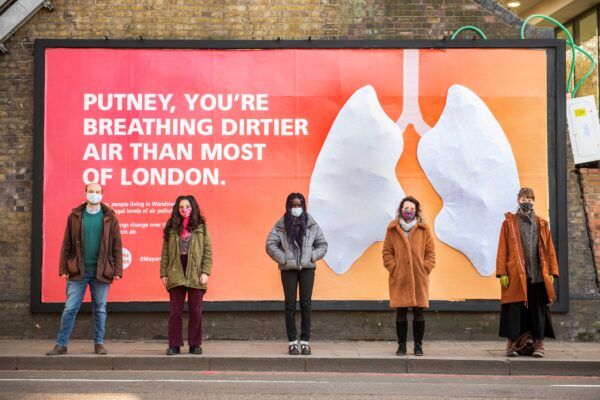Air pollution is an invisible killer, accounting for 7 million deaths annually. Campaigns are an important way to raise public awareness and build demand for clean air action by politicians and governments. By making the invisible issues of air pollution visible, creative campaigns stimulate important conversations and drive policy change. Here, we take a look at 5 creative clean air campaign ideas.
Visualising air pollution on lungs
To help Polish people see the impact of air pollution on their lung health, activist network Polish Smog Alert (PSA) created a set of artificial lungs that changed colour from white to grey as dust particles settled on them. Exhibited in 6 cities for 14 days each, the campaign encouraged people to apply for government subsidies to replace their old boilers with cleaner heating boilers. Building on the success of this, PSA later launched a digital version of this campaign. Over 22,00 screens around Poland displayed digital versions of the ”breathing” lungs as they changed colour in response to local air quality levels. The screens captured information about local concentrations of PM10 dust in real time, labelling levels of air quality as “moderate”, “poor”, and “very poor”.
Using ink made from smog
Air For Health, a network of medical professionals in Bulgaria, displayed large scale creative posters around the city of Sofia, with key messages written in ink made from smog. The network also sent letters to policymakers and influencers written in smog ink with the message “You are breathing this ad. Written with the ink of smog made from the air in Sofia”. The letter and creatives demanded action to implement regulations that promote clean air.
Hacking road signs
As part of the #MayorforCleanAir campaign, EDF Europe mobilised youth activists, parents and health workers to call on London mayoral candidates to address air pollution inequity. Choked Up, a group of Black and brown teenagers fighting for climate justice, installed ‘hacked’ road signs along major roads in London to read “POLLUTION ZONE” and “Breathing Kills”. To highlight the disproportionate impact of air pollution on people of colour and deprived communities, the signs were installed in areas of toxic and harmful air pollution, including Whitechapel, Catford and Brixton.
Student flashmob dance
To mark World Lung Day 2022, a group of students in Nepal performed a flashmob dance in a busy market square to raise awareness of the impact of air pollution on lung health and chronic respiratory conditions. The square is one of the largest world heritage sites in Kathmandu. Volunteers from the Nepal Public Health Students Society wore campaign t-shirts and engaged more than 500 people. Alongside this, Healthy Lungs Nepal kickstarted a social media campaign with an online art and video competition.
Using data to better understand the #AirWeShare
A London based campaign by Hubbub provided 10 Londoners with portable air quality monitors for a week to track air pollution hotspots and peak times for exposure. The participants went about their everyday lives, monitors in tow, to provide a richer understanding of when and where people are most exposed to toxic air pollution. From a yoga instructor to a sixth form student, each participant came from a different occupational background with different routines and schedules. Kings College London provided the monitors to measure black carbon, which is thought to be most likely from traffic. The campaign went one step further in raising awareness of air pollution in London by visualising Nitrogen Dioxide (NO2) levels in central London with colours and balloons. Their ‘Pollution Pavillion’ installation invited members of the public to press one of five buttons, each representing different areas in London. Pressing the buttons triggered the balloons to change colour, revealing whether NO2 levels aligned with WHO guidelines. Individuals were then invited to walk on the path of the pavilion to be immersed in the data and balloons.
See more

